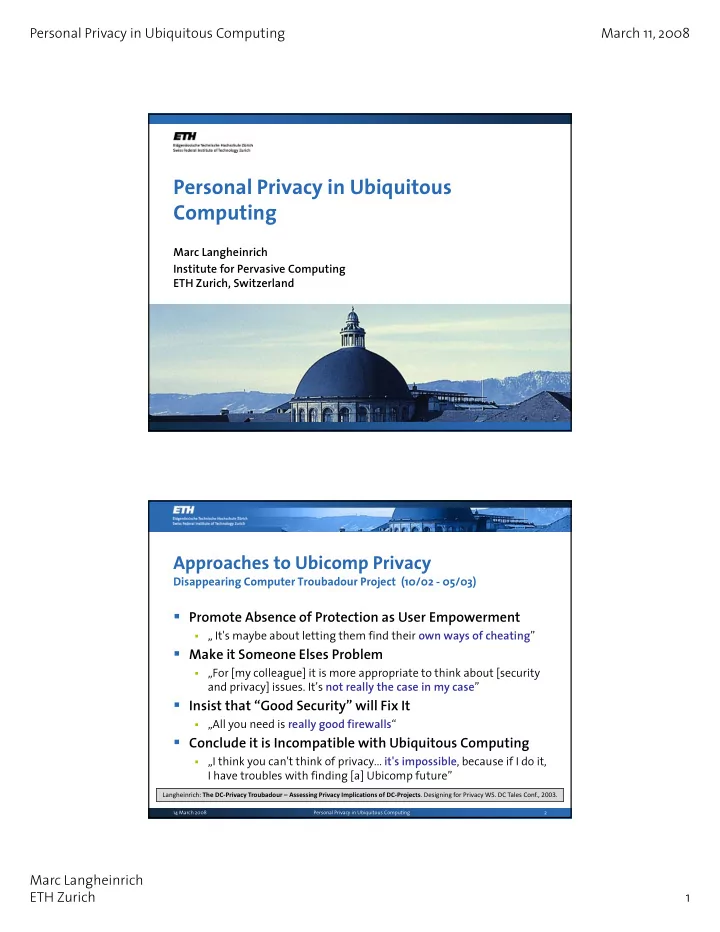

Personal Privacy in Ubiquitous Computing March 11, 2008 Personal Privacy in Ubiquitous Computing Computing Marc Langheinrich Institute for Pervasive Computing ETH Zurich, Switzerland Approaches to Ubicomp Privacy Disappearing Computer Troubadour Project (10/02 - 05/03) � Promote Absence of Protection as User Empowerment � „ It's maybe about letting them find their own ways of cheating ” � Make it Someone Elses Problem � „For [my colleague] it is more appropriate to think about [security and privacy] issues. It’s not really the case in my case ” � Insist that “Good Security” will Fix It y � „All you need is really good firewalls “ � Conclude it is Incompatible with Ubiquitous Computing � „I think you can't think of privacy... it's impossible , because if I do it, I have troubles with finding [a] Ubicomp future” Langheinrich: The DC ‐ Privacy Troubadour – Assessing Privacy Implications of DC ‐ Projects . Designing for Privacy WS. DC Tales Conf., 2003. 14 March 2008 Personal Privacy in Ubiquitous Computing 2 Marc Langheinrich ETH Zurich 1
Personal Privacy in Ubiquitous Computing March 11, 2008 Today‘s Topics � Background: Ubicomp Privacy � What is privacy? � How does ubiquitous computing affect it? � Privacy Infrastructure: PawS � Privacy beacons, privacy proxies, and privacy-aware databases databases � Real-World Example: RFID � PawS-RFID: privacy protocols for transparency � Shamir Tags: protection against unauthorized readouts Personal Privacy in Ubiquitous Computing 3 The Vision of Ubiquitous Computing „The most profound technologies are those that disappear . They weave themselves into the fabric of everyday life until they are indistinguishable from it.“ Mark Weiser (1952 – 1999), XEROX PARC � Basic Motivation of Ubiquitous Computing q p g � The computer as a tool for the everyday � Integrating computers with intuitive user interfaces � Things are aware of each other and the environment 14 March 2008 Personal Privacy in Ubiquitous Computing 4 Marc Langheinrich ETH Zurich 2
Personal Privacy in Ubiquitous Computing March 11, 2008 So what does this mean for personal privacy? 14 March 2008 Personal Privacy in Ubiquitous Computing 5 What is privacy anyway? 14 March 2008 Personal Privacy in Ubiquitous Computing 6 Marc Langheinrich ETH Zurich 3
Personal Privacy in Ubiquitous Computing March 11, 2008 What is Privacy? � „The right to be let alone.“ � Louis Brandeis, 1890 (Harvard Law Review) � „The desire of people to choose freely Louis D. Brandeis, 1856 - 1941 under what circumstances and to what extent they will expose themselves, y p , their attitude and their behavior to others.“ � Alan Westin („Privacy And Freedom“, 1967) Alan Westin Prof. Emeritus, Columbia University 14 March 2008 Personal Privacy in Ubiquitous Computing 7 Why Privacy? Privacy isn‘t just about keeping secrets – data exchange and transparency are key issues! g p y y � Reasons for Privacy � Free from Nuisance � Intimacy � Free to Decide for Oneself � Requirement for Democracy q y � Informational Self-Determination - German Federal Constitutional Court, Census Decision 1983 � „ …an essential requirement essential requirement for a democratic society that is built on the participatory powers of its citizens.” 14 March 2008 Personal Privacy in Ubiquitous Computing 8 Marc Langheinrich ETH Zurich 4
Personal Privacy in Ubiquitous Computing March 11, 2008 So what does this mean for personal privacy? 14 March 2008 Personal Privacy in Ubiquitous Computing 10 Ubicomp Privacy Implications � Data Collection � Scale (everywhere, anytime) � Manner (inconspicuous, invisible) � Motivation (context!) � Data Types yp � Observational instead of factual data � Data Access � “The Internet of Things” M.Langheinrich: Privacy by Design – Principles of Privacy ‐ Aware Ubiquitous Systems. Proc. of UbiComp’01. LNCS2201, Springer, 2001 14 March 2008 Personal Privacy in Ubiquitous Computing 11 Marc Langheinrich ETH Zurich 5
Personal Privacy in Ubiquitous Computing March 11, 2008 How do we achieve privacy? 14 March 2008 Personal Privacy in Ubiquitous Computing 12 Privacy – Not Just a Recent Fad � Justices Of The Peace Act (England, 1361) � Sentences for Eavesdropping and Peeping Toms � „The poorest man may in his cottage bid defiance to all the force of the crown. It may be frail; its roof may shake; … – but the king of England cannot enter; all his forces dare not cross the threshold of the ruined tenement“ dare not cross the threshold of the ruined tenement“ � William Pitt the Elder (1708-1778) � 1995 European Data Protection Directive 95/46/EC � Defined common European framework for national privacy laws 14 March 2008 Personal Privacy in Ubiquitous Computing 13 Marc Langheinrich ETH Zurich 6
Personal Privacy in Ubiquitous Computing March 11, 2008 Basis: Fair Information Principles (FIP) � Drawn up by the OECD, 1980 � “Organisation for economic cooperation and development” � Voluntary guidelines for member states � Goal: ease transborder flow of goods (and information!) � Five Principles (simplified) Openness Openness Collection Limitation Collection Limitation 1. 1. 4. 4. Data access and control Data subject’s consent 2. 5. Data security 3. � Core principles of modern privacy laws world-wide � Implication: Technical solutions must support FIP 14 March 2008 Personal Privacy in Ubiquitous Computing 14 FIP Challenges in Ubicomp 1. How to inform subjects about data collections? 2. How to provide access to stored data? 3. How to ensure confidentiality, integrity, and authenticity (w/o alienating user)? y ( g ) 4. How to minimize data collection? 5. How to obtain consent from data subjects? M.Langheinrich: Privacy by Design – Principles of Privacy ‐ Aware Ubiquitous Systems. Proc. of UbiComp’01. LNCS2201, Springer, 2001 14 March 2008 Personal Privacy in Ubiquitous Computing 15 Marc Langheinrich ETH Zurich 7
Recommend
More recommend
Stay informed with curated content and fresh updates.